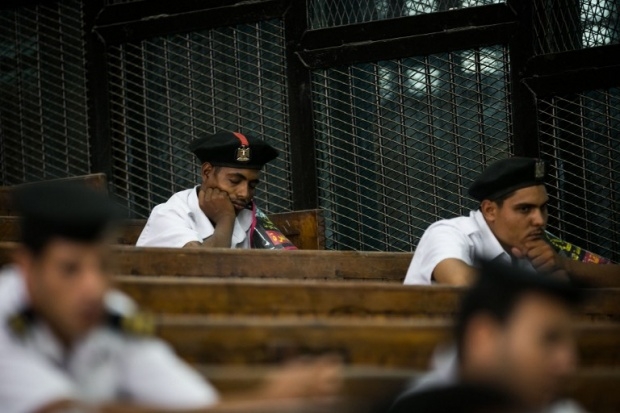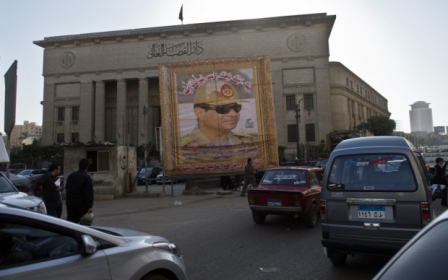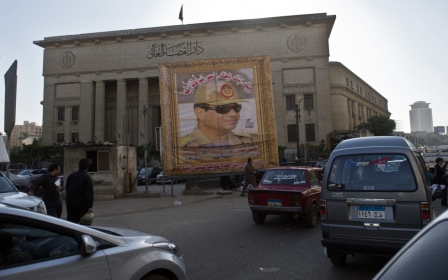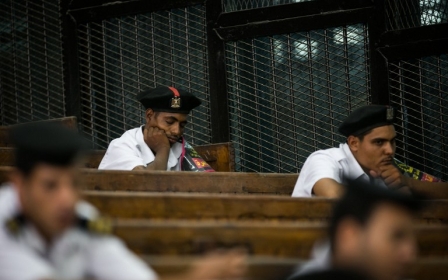Egyptian courts in peril

Since June 2013, news from the Egyptian court system has grown increasingly fantastic. Scores of activists have been arrested for mathematically impossible crimes. Egyptian citizens with no political affiliation have been imprisoned for rioting and political protests they did not attend. Random civilians have been arrested as Muslim Brotherhood conspirators. In one case, the connection was as tenuous as lending a member a small amount of cash.
Long reviled as another arm of Egypt’s inefficient bureaucracy, since the summer of 2013, the justice system has grown increasingly harsh on political prisoners, an apparent collusion, lawyers, prisoners, and activists have told the Middle East Eye, between the judicial system and the government of Egyptian President, Abdel Fattah Al-Sisi.
“It is one of the worst court systems in the world. Because time has no value,” said Nourhan Tharwat, media representative for Hisham Mubarak, a non-profit legal aid firm. Outside of political court, legal disputes, like divorce, wage or real estate cases, should be handled within months, but can take as long as four years, as judges and lawyers consistently push for trial postponement.
Political cases take a different precedent in the courtroom. In the past several years, separate court “streams” have formed. There, judges can follow extraneous legal measures for cases that present current threats to national security. Most often, political cases, both related to the Muslim Brotherhood and left leaning activist groups, are relayed to the terrorism court, and are held outside courthouses, on military or police land, which is closed to the public, according to lawyers at Hisham Mubarak. Terrorism, they explained, like much of Egypt’s penal code, is loosely defined, so can be applied to a range of cases. “Sisi, by constitution, is in control of all of the justice system, army and police,” said Afifi Al-Ahmar, lawyer and manager of legal aid at Hisham Mubarak.
With roughly 40,000 Egyptians arrested since June 2013, of which many have been held without charge in Egypt’s overcrowded prison system, some lawyers and activists accuse Egyptian courts of working with the regime, or following orders from the presidency in order to stifle dissent. “[Sisi’s cabinet] is playing the dirty work in the judicial system,” Nourhan said.
“Judges are under control of the state,” said Karim Abdelrady, a lawyer at the Arab Network for Human Rights Initiative. Some, like Abdelrady, hold the belief that judges follow direct orders to enact certain verdicts or punishment. Others believe they participate in the culture of state rule, catering to the greater political rule: “Judges are loyal to the state,” said Mohamed Farouk, another lawyer there.
Verdicts like the seven-year prison term of three Al-Jazeera journalists or the death sentence of 529 defendants accused of killing a police officer in Minya shocked the international community. “We can see this trend in the texts of courthouses [from the early 20th century] until now. Judges choose the extreme, the highest punishment,” said Nabil Abdel Fattah, a senior advisor for the state owned political analyst agency, Ahram Centre for Political and Strategic Studies. “But, there is also another trend: judges are too easy on prisoners, releasing many at the same time,” he added.
Lawyer reports from the courtroom paint a picture of a surreal space where due process is rarely followed, unrelated and often fabricated evidence is presented against defendants.
During Ala’a Abdel Fattah’s trial, guards barred him from entering the courtroom. The judge charged him in absentia, which often brings harsher punishment. Abdel Fattah was accused of beating a police officer and stealing his radio during a protest, which many have testified, he did not attend. “Public prosecution didn’t give them enough time to read the evidence, but it’s not about space or time. They restrict our access to trials,” Abdelrady said.
During the al-Jazeera trial, Judge Mohamed Nagy Shehata, forced defence lawyers to either agree to pay 1.2 mn Egyptian pounds to watch a piece of evidence or meet at a specific place and time to watch the video. Shehata never shared the time or location and told the defence that they missed their opportunity to view the footage.
In Egypt, becoming a judge is a nominative process where accomplished lawyers are chosen for their work to become a judge. More often than not, lawyers say judges are elected through familial connections. There are reportedly six judges in one governorate from the same family.
“The judicial system is not independent. Judges can be ministers after their career is finished,” Farouk said. Under Mubarak, the Central Security Forces and Sisi, all judges held the same position. Mohamed Morsi’s cabinet attempted to force Muslim Brotherhood members into the judiciary, but ultimately failed.
Now, court cases are being referred to particular judges, many of whom have notorious reputations for harsh sentencing for political cases. Mohamed Nagy Shehata, a judge in Cairo, has overseen all the trials of the Raba’a protestors, al-Jazeera journalists, Shoura Council clashes where Ala’a Abdel Fattah was originally arrested, Mohamed Soltan, and Ahmed Douma, amongst others. Nagy Shehata often postpones trials. “He is waiting the political decision, not even checking the papers,” Aififi said. Nagy Shehata claims to be an ex-police officer and is frequently accused of disregarding evidence for his own personal decisions. “He always shows partiality to the Ministry of Interior,” said a lawyer who declined to be named. “The conscience of the judge is legal,” Aififi said.
Activists and lawyers describe that the courts verdicts often coincide with the general political will at the time. In some cases, international campaigns for prisoners can work. Prominent activists like Ala’a Abdel Fattah and Mahienour al-Massry, were in part, successful in securing their releases, but often court rulings can follow greater political events. To the surprise of lawyers, Mahienour al-Massry and Ala’a Abdel Fattah were released shortly before John Kerry visited Cairo and Sisi spoke at the United Nations. Several weeks before, US President, Barack Obama publically asked for the release of Ahmed Maher, the 6th of April founder, who is still imprisoned.
The recent rash of extreme verdicts, some believe, is circumstantial. “The attacks on the judges from the Muslim Brotherhood, Salafists, Ansar Bayt al-Maqdis, Revolutionary Socialists, the 6th of April Movement and the media are all presenting the judges as a threat to society. For this reason, their social status and independence are threatened and some act in an extreme way,” Abdel Fattah said.
Others, like the lawyers at Hisham Mubarak have a different idea, “the judicial system is taking revenge for the Mubarak regime,” Nourhan said.
New MEE newsletter: Jerusalem Dispatch
Sign up to get the latest insights and analysis on Israel-Palestine, alongside Turkey Unpacked and other MEE newsletters
Middle East Eye delivers independent and unrivalled coverage and analysis of the Middle East, North Africa and beyond. To learn more about republishing this content and the associated fees, please fill out this form. More about MEE can be found here.




